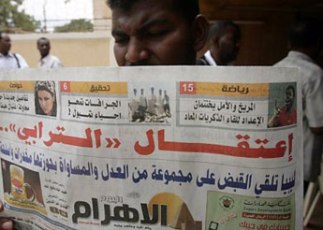Sudan orders newspapers not to report on rebels
September 15, 2011 (KHARTOUM) – Sudanese security authorities have instructed newspapers to steer clear of reporting on statements or activities of rebel groups in the country, the latest action against freedom of press.
 A number of sources told Sudan Tribune that the National Intelligence and Security Services (NISS) phoned chief editors of national newspapers and ordered them not to publish any statements by Darfur rebel leader Khalil Ibrahim or leaders of the Sudan People’s Liberation Movement North (SPLM-N), which is fighting the government in Blue Nile and South Kordofan states.
A number of sources told Sudan Tribune that the National Intelligence and Security Services (NISS) phoned chief editors of national newspapers and ordered them not to publish any statements by Darfur rebel leader Khalil Ibrahim or leaders of the Sudan People’s Liberation Movement North (SPLM-N), which is fighting the government in Blue Nile and South Kordofan states.
Sudanese newspapers are already hard-pressed by the NISS which regularly censors their contents prior to publication and confiscate their copies after they were printed, inflicting a heavy financial penalty on them.
The NISS on Wednesday confiscated copies of the pro-government daily Akhbar Al-Yawm after it published statements by Khalil Ibrahim, the leader of the Justice and Equality Movement which is fighting the government in the country’s western region of Darfur.
Akhbar Al-Yawm, however, failed to speak about its ordeal.
Over the last two months, Sudan confiscated copies of two privately owned newspapers and a pro-opposition one, in clear violation of the country’s constitution which guarantees freedom of press.
A senior member of Sudan’s ruling National Congress Party (NCP) denied any knowledge of the confiscation of papers. Samia Mohamed Ahmad said she had not heard that any newspapers were confiscated since pre-publication censorship is lifted.
Officially, Sudan announced it stopped direct censorship against newspapers but chief editors were forced to sign a so-called “code of journalistic conduct” which obliges them to exercise “self-censorship and refrain from publishing materials harmful to the state.
A Sudanese lobby group has denounced the confiscation of papers as a constitutional abomination.
The Network of Sudanese Journalists said on September 5 that the confiscation of the pro-opposition Al-Maydan and the privately owned daily Al-Jaridah violated Sudan’s interim constitution and international accords ratified by the country.
The group also said that NISS’s continuing confiscation of papers was a dangerous indication of curtailing freedom of expression and of restricting and weakening the press.
Reporters Without Borders, an international press freedom organisation, in June slammed “the disgraceful way the [Sudanese] authorities are harassing and prosecuting journalists in Khartoum and the north of the country in an attempt to silence them and stop embarrassing revelations about human rights violation by the security forces”.
Another press-freedom watchdog, the Committee to Protect Journalists (CPJ), said that Sudanese authorities continue to “aggressively” target individual journalists and publications through “contrived legal proceedings, politicized criminal charges, and confiscations.”
Results published as part of UNESCO 2011 World Press Freedom Day, Sudan ranks as 40th worst out of 48 in Sub-Saharan Africa for press freedom. Amnesty International describe Sudan as a place where freedom of speech is being “openly violated”.
(ST)
